- Home
- Robin LaFevers
Dark Triumph (His Fair Assassin #2) Page 12
Dark Triumph (His Fair Assassin #2) Read online
Page 12
He nods, but says nothing.
There is more bruising and swelling along his middle. I reach out and gently press. He gasps, then grabs my hand with his good one, surprising me, for the gentleness of his touch is incongruent with his size and bulk. “You do not need to prod and poke at my ribs for me to tell you they’re broken.”
“Very well. There is nothing left to do but examine your leg, and that is the one injury that frightens me the most.”
The jailor was too lazy—or modest—to remove the man’s riding breeches, so I take the small knife from the chain at my waist and quickly cut away the sodden, filthy leather. As I reach to pull it aside, he swats my hand aside. Puzzled, I look up to find his cheeks pink and cannot help but smile. The Beast of Waroch is embarrassed. “Pish,” I tell him. “It is nothing I have not seen before.” His eyes widen in surprise, but I reach out and pull the leather from his thigh.
The jailor gasps—in shock, perhaps?—and I suck in my breath. “That bad?” the knight says.
The entire thigh is red and swollen and hot to the touch. Foul stuff oozes from the wound itself, and streaks of red have begun to work their way up and down the leg. I glance up to find a faint grin on his face and, not for the first time, wonder if all he has endured has caused him to lose his wits. I turn my gaze back to the cut. “It is bad,” I agree. “Fortunately for you, I am not a surgeon, so I cannot cut it off were I so inclined.”
“Nor would I let you.”
“I am not sure you are in a condition to stop me,” I mutter, then hold up my hand before he can begin arguing. “I will not cut it off, but what I must do will not be enjoyable either.”
Beast studies me. “Who are you that you know so much about caring for battle injuries? I have yet to meet a noblewoman who tends wounds like a field physician.”
To give myself some time to think, I return to the fire and fetch the hot brew from the bubbling pot. What do I tell the man? I wonder as I begin spooning the herbs and mud into the linen cloths I have prepared. I am d’Albret’s daughter, you oaf, and you have just ensured he will follow us to the ends of the earth. But I find I am unwilling to trumpet my true identity. Indeed, I wish to leave it far, far behind me, bury it like a corpse, and never speak of it again. Besides, if he learns who I am, he will never trust me to get him to safety. Still, I must tell him something.
I think back to the first time I saw him, down in the field with the duchess and her party. “I am a friend of Ismae’s.”
“Ismae!” He tries to prop himself up on one elbow, then winces and eases back down on the table. “How do you know Ismae?”
I can feel his eyes upon me, assessing, weighing, but I concentrate very carefully on folding the square of soft linen around the boiled herbs. “We trained at the same convent.”
There is a moment of silence during which I think he will let the matter drop, but no. “If you are an assassin trained, why are you here tending me?”
Unable to help it, I twist my mouth into a bitter smile as I return to his side. “It is a question I have asked myself many times, you can be certain. My orders were to ensure you got safely to Rennes so that you could further serve the duchess.” I look up and meet his gaze. “So that part of my taunting was true.”
We stare into each other’s eyes for a long moment, before the knight gives a small nod—of understanding or forgiveness, I am not certain. “Well then.” He smiles, an utterly charming and devastating grin that makes me want to smile back at him. Instead, I lay the hot poultice on his thigh.
He sucks in his breath so hard I fear he has swallowed his tongue. His face grows red from the heat and the pain and the effort to not cry out. “I thought you said you were not here to kill me,” he finally says with a gasp.
“I am sorry,” I say. “It is the only way to draw out the poison so you will not die of blood fever.”
“Just warn me next time.”
“Very well, I am putting one on your shoulder now.”
He gasps out again, but it is not as forceful as before. Good. The wound is less tender, then, and will hopefully be that much quicker to heal. I glance back up at him to see how he is doing. “You should, by all rights, be dead from these wounds.”
A brief flash of white teeth. “A gift from Saint Camulos. We heal quickly.”
As the poultices draw the foul humors from his body, I turn my attention to his arm. “This must be cleaned,” I warn him. “Vigorously.”
My patient grimaces. “Do what you must so that I may have full use of the arm.”
The next hour is not a pleasant one. I lay a wet cloth on the cut to soften it, then replace the poultices with fresh ones. “Would you like some wine or spirits to ease the pain?” I ask, but he gives a sharp shake of his head.
When the scab is soft enough I take a cloth and begin gently sponging away the dirt and grime and old mud that cakes the wound.
“You never said how you know so much about treating injuries,” the knight says.
I glance up at him in annoyance. “Why have you not yet passed out from the pain?”
“I welcome pain; it lets me know I am alive.”
While I cannot help but admire his spirit, I remind myself that it is wasted effort to like someone who will likely die of his wounds anyway. “You are as mad as your reputation suggests.”
He grins. “You have heard of me?”
I roll my eyes. “I have heard of a madman who dons battle fever like most men don armor and charges out into the field killing nigh unto hundreds of souls.”
He settles more comfortably onto the blanket. “You have heard of me,” he says, the satisfaction thick in his voice. “Ow!”
“My pardon, but the gravel and mud is ground in deep.” I work in blessed silence for a while, marveling that a man so ugly can have such a charming grin. Annoyed that I am thinking of such things, I get up to fetch a knife. The wound is infected and will need to be drained.
“You still have not told me how you come to know so much about treating injuries.”
“You talk too much. Lie still and try to heal quickly, will you?” I say, returning to his side with the knife. “We have a long way to go and your condition will slow us down considerably. Indeed, we will likely be captured if you do not get better soon.”
The Beast of Waroch scowls, and I can feel the jailor studying me. I wonder how much he has pieced together from my visit to the dungeon with Julian. “Perhaps you are hiding something?”
Only the truth of who I am. “No, I just prefer to work in silence. However, since you insist—I was trained at the convent in small medicines such as this.”
Disbelief is plain on his face. “This is no small medicine.”
I lay the finely honed blade of my knife along the oozing scab. It parts easily, like a flower opening before the sun. “My brothers were knights as well. They often had injuries such as these that needed to be treated.”
“By their sister?” he asks between clenched teeth.
“We were close.” Also, my father did not keep a physician on staff, and my brothers were too embarrassed to seek out the surgeon of the men-at-arms for the beatings and lashing my father bestowed upon them. “However, now that I have answered your question—”
He snorts. “That was no answer.”
“—you must answer one of mine.” He looks at me cautiously. “Who is your pet gargoyle and how is Count d’Albret’s own jailor more loyal to you than to the count? For not only did he allow you to escape—he helped me.”
Of a sudden, all lightness and good humor disappears from Beast’s face. “Perhaps he did not wish to stay behind and accept d’Albret’s punishment.”
“Perhaps not,” I say, disappointed, for I know that is not the reason, or at least, it is only one part of it.
“What do you know of d’Albret?” Beast asks.
“More than I care to,” I mutter as I place another poultice on his arm to draw out the infection.
“You do well to fear hi
m. Even for someone with your skills, it is not safe to be near the man.”
I fight the urge to laugh in his face for daring to warn me of the dangers d’Albret presents. “You need not worry. I know all about Count d’Albret. Stories circulated throughout his hall faster than the annual plague. Indeed, it was one of the old women’s favorite pastimes, terrorizing us with the tale of d’Albret’s first wife. Have you heard it?” I glance up, my eyes wide and innocent.
He gives a curt shake of his head.
“Oh, la, everyone knows the story of his first wife. Indeed, it has become legend, one told by beleaguered husbands and tired matrons when they wished their wives or young charges to be more pliant. ‘Did I ever tell you the story of Count d’Albret’s first wife, Jeanne?’ they would ask. ‘She thought to escape her wifely duties and fled to her family home, where she begged sanctuary with her brother. Well, her fool brother should have known better than to come between a man and his wife, but he had a soft heart and agreed to harbor her against the cruelty she claimed of her own husband.
“‘But that d’Albret,’ they’d say, often with admiration in their voice, ‘he let no man take what was rightfully his and certainly not some baron from Morbihan. He rode with a full battalion of men straight to the baron’s holding, where he burst through the gates and slaughtered every one of the men-at-arms as they scrambled for their weapons. He rode his horse right into the main hall and killed the baron at his table, and then d’Albret struck down his own wife even as she begged for mercy.’” As I tell the story, I feel those earlier tendrils of hope begin to wither. What was I thinking? There can be no escape from d’Albret. All I have done is delay the inevitable.
“To be certain his point was made,” I continue, “d’Albret killed the baron’s wife and two young sons and the newborn babe she nursed at her breast.” My heart twists painfully at the thought of that babe. “Wives usually did what their husbands asked of them after that tale was told.” I look up to see that Beast’s face is hard as stone. “So yes, I do know what d’Albret is capable of.”
I remove the poultice, relieved to see the swelling has already gone down. Next, I reach for the flask of spirits. “This will sting a bit,” I tell him. It is a lie, for it will burn like fire, but I cannot talk to this man anymore. I know from long experience that hope is but a taunt from the gods, and I hate that somehow this man causes me to feel it.
Beast opens his mouth to speak just as I tilt the flask. “My sister was his sixth wife—” The spirits hit his raw flesh and he rears up on the table, roaring in pain, before finally blacking out.
Chapter Seventeen
SHOCKED, I STARE DOWN AT the unconscious giant before me. His sister was d’Albret’s wife? How can that be? What crazed, tangled web have the gods woven around us?
I study the lumpy, bruised face, searching for signs of Alyse, d’Albret’s sixth wife. She spoke of having a brother, but it is hard to imagine them springing from the same womb.
Knowing I will not be able to sleep with Beast’s admission plaguing me like the biting flies of high summer, I tell the gargoyle that I will take the first watch. Even though this hunting lodge is well hidden, we dare not lower our guard.
He does not argue and curls up near the dying fire and falls asleep with an ease I cannot help but envy. Only then, when no one can see, do I let myself think of Alyse.
Her hair was the reddish blond of a fox kit’s fur, and her face covered in freckles that my brothers claimed were the pox but that I thought were merely homely. She was always bringing flowers into the house, not just from our formal garden, but from the meadows as well. Even budding branches from the fruit trees in our orchard, which made the servants think she was daft.
Even more exhilarating, she brought smiles and laughter. It was as if the sun had finally emerged from the clouds in our household, or at least at first. My older brothers took cruel delight in tormenting and teasing her. And Julian, well, I think he begrudged her my affection, for every minute I spent with her was one I did not spend with him. And even with all of that, she was kind to me up until the end.
That Beast is her brother . . . well, clearly the gods are having a rich jape at my expense.
Or . . . the thought comes to me slowly . . . perhaps they are giving me a chance to balance the scales of justice. For if I am able to save this man from d’Albret’s dungeons and deliver him safely to Rennes, I will have paid back some small part of the debt I owe his family.
Desperate to distract myself from the truth I have just learned, I push away from the sleeping knight and pick up the filthy discarded clothing and the dirty rags. We will have to bury these. Or perhaps I will send the gargoyle out to burn them. If he could set the fire at a great enough distance, it might even direct d’Albret’s search away from us.
When I have tidied as best I can, I take a sharpening stone from one of the bundles and move outside. The rain has stopped, which will make it easier to listen for approaching horses. I remove one of my knives from its sheath and draw the stone along its edge. The faint scraping sound is as calming as a lullaby to my frayed nerves. Like a scavenger eager to pick over carrion, my reeling mind keeps returning to the one thing I do not want to think about. Truly, the gods have outdone themselves this time, for there are few people in this world I owe a greater debt to than Alyse. There are fewer people my family has wronged more horribly.
Is it possible I have been given a chance to right those wrongs?
Not that it matters, for getting Beast to Rennes alive and whole and without being found by d’Albret’s scouts is not any easier simply because he is Alyse’s brother.
It is, however, that much more vital that I do so, for more than the kingdom’s future hangs in the balance—my one small chance at redemption does as well.
When I run out of chores to keep me outside, it is time to return to the kitchen. There is much to be done—new poultices to be prepared, bandages to be cut, fires to be tended. Those tasks do not care one whit for the newfound shyness I feel toward Beast. Will he bring up the subject of his sister when he awakens? And if he does, how can I keep all the questions I have from spilling out?
Inside, I see that Beast’s eyes are open and he is staring at the ceiling above him. “You are still alive,” I say. “That is more than I dared hope for.”
He turns his head to me. “I told you I was hard to kill.”
“You did warn me, yes.” I can feel his eyes on me as I busy myself with putting more water on to boil. Does he even remember that he spoke of Alyse? And what would a simple assassin wish to know of that connection? Nothing, most likely. “Is that why you were not slain on the battlefield?” I ask. “Some gift of Saint Camulos? Or was it because d’Albret had other plans for you?”
“Saint Camulos does not protect us from death.” Beast’s voice is dry. “Nor did the men realize whom they had unhorsed. However, once d’Albret saw who I was, let us just say he is not one to let such an opportunity go to waste.” He is quiet for a moment, then speaks again. “Do you know what they had planned for me?”
Unable to help myself, I look up and meet his gaze. “I do.”
He nods. “Then you understand the debt I owe you.”
Uncomfortable with the gratitude I see in his eyes, I look back to the pot of water. “Do not be so very grateful. If I had not been able to get your lumbering carcass up those stairs, I would have killed you myself and saved d’Albret the trouble.”
“Then I would have owed you an even greater debt, for not everyone recognizes the mercy in a quick, clean death.” He pauses then, studying me. “How would you have done it?”
His question surprises me. “You mean how would I have killed you?”
“Yes. Do you have a favorite method for such things?”
Since he knows I am an assassin, there is no need to be coy. “I prefer a garrote. I like the intimacy it allows me when I whisper reminders of vengeance in their ears as they die. But in your case, I had sharpened my favorit
e knife especially for the occasion.”
His brows quirk up. “Why no garrote for me?”
I look pointedly at his thick neck, bulging with muscle and sinew. “I do not have one big enough,” I mutter. “Besides, yours was to be a merciful death. A knife is quicker and less painful.” If I thought my confession would shock him into putting some distance between us, I was sorely mistaken, for the great lummox laughs.
Frustrated by this kindness—one I do not deserve—I set the new poultice on his thigh, and his laughter quickly turns to grunts of pain.
Shortly after that, I gently nudge the gargoyle awake, for if I do not get some rest soon, I fear I will grab Beast by his shoulders and force him to answer all the questions crowding their way onto my tongue. It would not take him long to figure out my connection to d’Albret if I were to do that.
The jailor springs nimbly to his feet, checks once on his prisoner—now his patient—then goes to sit by the door. I stretch out by the fire and pray I will not dream of Alyse. Indeed, I do not wish to dream at all.
I come awake with a start, surprised that I have slept. It is nearly dark outside, and the ashes are cold in the hearth. I have slept almost all day. As I sit up, it occurs to me that it is too quiet. Is that what woke me? And then I hear it. The faint jingle of a harness and the soft whinny of a horse.
Panic surges in my breast and I leap to my feet. The gargoyle lurks in the doorway, peering out into the yard. With one hand he holds up three fingers, and in the other he holds his slingshot and a fat round rock the size of a quail’s egg.
There is a rustle as Beast stirs. I hurry over to him, desperate to keep him quiet. He opens his eyes, but when he sees me put my fingers to my lips, he gives a curt nod, then motions me closer. “Give me a weapon,” he whispers hoarsely.
“You are too sick to fight,” I whisper back.
He grabs my arm, his eyes burning with determination. “I will not go back there alive.” A moment of complete understanding passes between us. I nod, then retrieve one of the knives strapped to my ankle and hand it to him. When he takes it, his hand wraps briefly around mine and gives it a firm squeeze. “How many?” he asks.

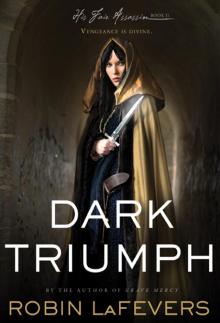 Dark Triumph
Dark Triumph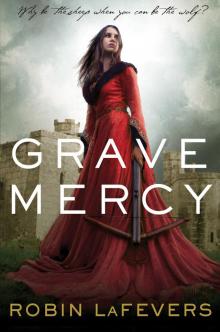 Grave Mercy
Grave Mercy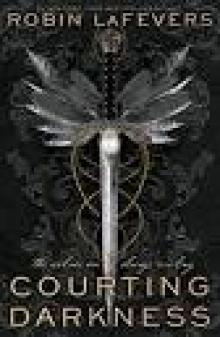 Courting Darkness
Courting Darkness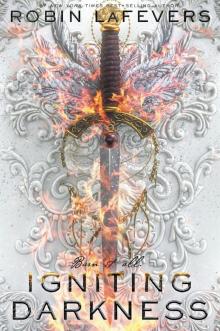 Igniting Darkness
Igniting Darkness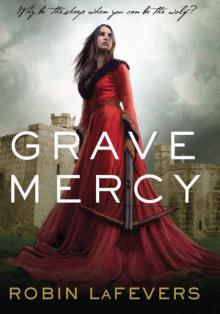 Grave Mercy (Book I) (His Fair Assassin Trilogy)
Grave Mercy (Book I) (His Fair Assassin Trilogy)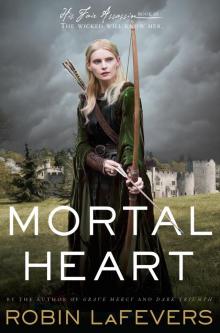 Mortal Heart
Mortal Heart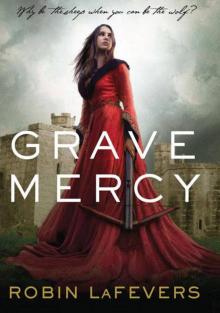 Grave Mercy (Book I): His Fair Assassin, Book I (His Fair Assassin Trilogy)
Grave Mercy (Book I): His Fair Assassin, Book I (His Fair Assassin Trilogy)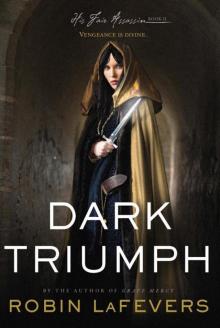 Dark Triumph (His Fair Assassin #2)
Dark Triumph (His Fair Assassin #2)